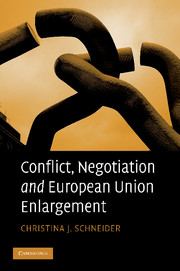Crossref Citations
This Book has been
cited by the following publications. This list is generated based on data provided by Crossref.
Holzinger, Katharina
and
Schimmelfennig, Frank
2012.
DIFFERENTIATED INTEGRATION IN THE EUROPEAN UNION: MANY CONCEPTS, SPARSE THEORY, FEW DATA.
Journal of European Public Policy,
Vol. 19,
Issue. 2,
p.
292.
Pullano, Teresa
2014.
La citoyenneté européenne.
p.
281.
Slapin, Jonathan B.
2015.
How European Union Membership Can Undermine the Rule of Law in Emerging Democracies.
West European Politics,
Vol. 38,
Issue. 3,
p.
627.
Grande, Edgar
and
Hutter, Swen
2016.
Beyond authority transfer: explaining the politicisation of Europe.
West European Politics,
Vol. 39,
Issue. 1,
p.
23.
Schimmelfennig, Frank
and
Winzen, Thomas
2019.
Grand theories, differentiated integration.
Journal of European Public Policy,
Vol. 26,
Issue. 8,
p.
1172.
ATAKARA, Pınar
2020.
AB KOŞULLULUK POLİTİKASININ GÜNCEL ANALİZİ: “İYİ KOMŞULUK İLİŞKİLERİ VE İKİLİ İLİŞKİLERİN NORMALLEŞTİRİLMESİ” KAPSAMINDA SIRBİSTAN-KOSOVA DİYALOĞU ÜZERİNE İNCELEME.
Ankara Avrupa Calismalari Dergisi,
Vol. 19,
Issue. 1,
p.
55.
YILDIZ, Ayselin
2021.
BREXIT, GÖÇ VE AVRUPA BÜTÜNLEŞME SÜRECİ.
Ankara Avrupa Calismalari Dergisi,
Vol. 20,
Issue. ,
p.
69.
Bélanger, Marie-Eve
and
Schimmelfennig, Frank
2021.
Politicization and rebordering in EU enlargement: membership discourses in European parliaments.
Journal of European Public Policy,
Vol. 28,
Issue. 3,
p.
407.
KENAR, Nesrin
and
HODZA, Bajram
2022.
AVRUPA BİRLİĞİ'NE ÜYELİK SÜRECİ BAĞLAMINDA KOSOVA-AB İLİŞKİLERİ.
Giresun Üniversitesi İktisadi ve İdari Bilimler Dergisi,
Vol. 8,
Issue. 1,
p.
161.
Idriz, Narin
2022.
Legal Constraints on EU Member States in Drafting Accession Agreements.
Vol. 12,
Issue. ,
p.
125.
Stone, Randall W.
2024.
Christina L. Davis. 2023. Discriminatory Clubs: The Geopolitics of International Organizations. (Princeton: Princeton University Press).
The Review of International Organizations,
Vol. 19,
Issue. 1,
p.
181.





